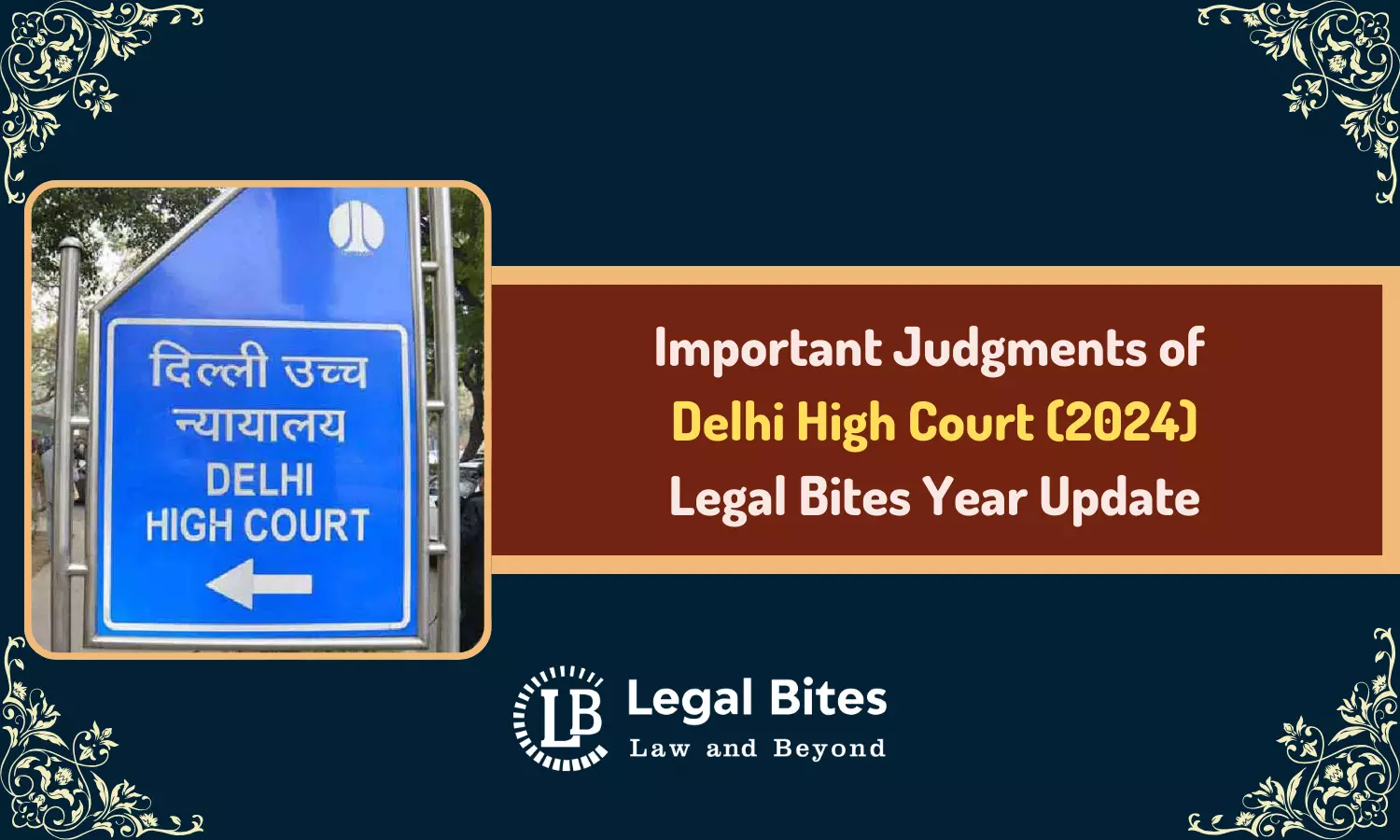Important Judgments of Delhi High Court (2024) - Legal Bites Year Update
Legal Bites brings you a roundup of Important decisions of the Delhi High Court (2024), which played a significant role.

Legal Bites brings you a roundup of Important decisions of the Delhi High Court (2024), which played a significant role. It will help the readers to remember all legal and current updates of 2024 pertaining to the Delhi High Court in the most efficient and easy way.
Important Judgments of Delhi High Court (2024) - Legal Bites Year Update
1) Employer-Employee Relationship and Charitable Trusts
In Satish Kumar v. Holistic Child Development India & Ors. (2024), the Delhi High Court dismissed the writ petition challenging a Labour Court Award dated 13.04.2010. The Labour Court had concluded that the respondent, a charitable trust, was not an “industry” under Section 2(j) of the Industrial Disputes Act and that no employer-employee relationship existed between the petitioner and the respondent.
The High Court upheld these findings, emphasizing the absence of sufficient evidence from the petitioner to establish the respondent’s status as an industry or prove his permanent employment. The Court reiterated the limited scope of judicial review under Article 226, holding that no substantial injustice was evident in the Labour Court’s decision.
2) Eligibility Criteria for Recruitment to Deputy Commissioner Post
The Delhi High Court, in the case of Kendriya Vidyalaya Sangathan v. T. Pritam (2024), upheld the decision of the Central Administrative Tribunal (CAT) directing the petitioner (KVS) to consider the respondent’s appointment to the post of Deputy Commissioner (DC). The respondent empanelled for the post in March 2023, was not appointed despite rising vacancies, prompting him to approach CAT. KVS contested the CAT order, alleging the respondent’s ineligibility and suppressing facts regarding prior appointments.
The Court rejected these claims, citing a Ministry of Education clarification that validated the respondent’s eligibility and the absence of disciplinary proceedings or supporting evidence for KVS’s allegations. The Court held that KVS’s reliance on outdated rules and its attempt to raise new arguments not presented before the Tribunal could not be entertained. The petition was dismissed with a six-week extension for compliance with the Tribunal's order.
3) Balancing Free Speech and Hate Speech on Social Media
In Mohammad Hamim and Anr. v. Facebook India Online Services Pvt. Ltd. & Ors. (2024), the Delhi High Court dismissed a PIL seeking directions to Facebook (Meta Platforms Inc.) to monitor and suspend hate speech targeting the Rohingya community. The petitioners alleged that Facebook’s algorithms amplify harmful content for revenue, violating Section 153A of the IPC.
The Court held that the IT Rules, 2021, provide a robust regulatory framework, including mechanisms for removing objectionable posts and addressing grievances. Noting that most referenced posts were already removed and that alternative remedies under the IT Rules were available, the Court declined to intervene. It rejected the demand for prior censorship as unconstitutional and emphasized that the petitioners should utilize the existing grievance redressal mechanisms.
4) Fresh Demarcation Ordered in Land Dispute Under Forest Act
In the case of Rupinder Singh Bedi & Ors. v. Department of Forest and Wildlife & Ors. (2024), the petitioners challenged a notice issued by the Deputy Conservator of Forests alleging encroachment on reserved forest land in Asola, New Delhi, and sought relief under Article 226 of the Constitution of India. The petitioners, claiming ownership of the disputed land through registered sale deeds, argued that demolition actions were carried out without proper demarcation or their participation.
The court directed the respondents to conduct fresh demarcation proceedings in the presence of the petitioners within six weeks, based on the petitioners' prior request for demarcation, and to maintain the current status of the land until the report is furnished to all parties.
5) Legal Battle Over Unauthorized Premises
In Sh. Anil Kumar & Ors. v. Delhi Development Authority & Anr. (2024), the Delhi High Court dismissed a series of writ petitions challenging the eviction and demolition orders issued under the Public Premises (Eviction of Unauthorized Occupants) Act. The petitioners, who claimed occupancy rights as licensees of a previous owner, Raja Ram, failed to produce any credible evidence, such as lease deeds or documents, supporting their claims of regularization or lawful tenancy.
The court observed that the payments made to the Delhi Development Authority (DDA) were categorized as damages for unauthorized occupation, not license fees. Further, the court found no procedural irregularities in the DDA’s actions and noted the petitioner's failure to establish eligibility for regularization under DDA policies. Upholding the eviction and demolition orders, the court concluded that the petitioners' occupation was unauthorized and dismissed the petitions.
6) DTC Gratuity Case: Autonomy in Implementing Pay Commission Recommendations
In Delhi Transport Corporation v. Puran Masi Ram (2024), and the connected matter, the Delhi High Court addressed the applicability of the 6th Central Pay Commission’s recommendations on gratuity to autonomous bodies like the Delhi Transport Corporation (DTC). The Central Administrative Tribunal (CAT) had previously allowed claims by respondents for enhanced gratuity of ₹10,00,000 as per the 6th CPC recommendations.
The Court, however, held that such recommendations are not automatically applicable to autonomous organizations like DTC, which have the discretion to adopt them and decide the effective date. Since DTC had resolved to enhance the gratuity limit only from May 24, 2010, employees who retired earlier, such as the respondents, were not entitled to the enhanced amount. Consequently, the Court set aside the CAT’s orders and dismissed the petitions.
7) Inspection and Access to Records Vital for Responding to Fraud SCNs
In Shantanu Prakash v. State Bank of India & Ors. (2024), the Delhi High Court addressed a plea challenging the issuance of Show Cause Notices (SCNs) by various banks, including SBI, to the petitioner, an ex-director of M/s Educomp Solutions Limited, seeking to classify the company's account as "Fraud." The petitioner argued that the SCNs were issued without providing the requisite documents essential for responding effectively.
The court emphasized adherence to principles of natural justice, directing the lead bank (SBI) and the Resolution Professional (RP) to grant the petitioner access to the company's records for inspection and provide necessary documents. The petitioner was directed to file replies to the SCNs within a specified timeline, and the banks were instructed to consider any requests for personal hearings. The petition was disposed of with these directions, ensuring fairness and procedural compliance.
8) Delhi High Court Denies Concurrent Sentencing for ISIS-Linked Convict in UAPA Cases
In Mohsin Ibrahim Sayyed v. National Investigation Agency (2024), the Delhi High Court dismissed the petitioner’s plea for concurrent running of sentences awarded in two separate cases under the Unlawful Activities (Prevention) Act, 1967 (UAPA). The petitioner, convicted for terrorist activities linked to ISIS, had been sentenced by trial courts in Mumbai and Delhi to a combined 15 years of rigorous imprisonment.
The court, referencing the severity of the offences and their impact on national security and societal harmony, held that the sentences, arising from distinct transactions, could not run concurrently. It emphasized that leniency had already been extended at the sentencing stage and that the gravity of UAPA offences warranted consecutive sentences.
9) High Court Rules on NFFU for Static Postings in BSF
In Pawan Kumar v. Union of India & Anr. (2024), the petitioner, Deputy Commandant (Executive) in the BSF, challenged the denial of Non-Functional Financial Upgradation (NFFU) at the JAG level w.e.f. 01.04.2017 due to non-completion of two years of Mandatory Field Service (MFS). The Court held that the petitioner was denied MFS due to public interest postings in static law branches and had been granted relaxation by the DG, BSF under Rule 12. The Ministry of Home Affairs' rejection of this relaxation was deemed arbitrary and unsustainable.
The Court directed reconsideration of the petitioner’s NFFU eligibility, excluding the MFS requirement, with arrears to be paid within four weeks of eligibility confirmation, failing which interest at 6% p.a. would apply.
10) Industrial Disputes and Judicial Review: Lessons from a Bank Employee’s Dismissal Case
In Punjab National Bank v. Kartar Singh (2024), the Division Bench of the Delhi High Court addressed the challenge to an Industrial Tribunal Award and Single Bench judgment concerning the dismissal of the respondent from service. The respondent, a bank employee, was dismissed following charges of tampering with records and misconduct, including opening a fictitious account.
The Tribunal held the dismissal disproportionate, reinstated the respondent, and modified the punishment to the withholding of four increments with cumulative effect, along with full back wages. The Single Bench upheld this decision. However, the Division Bench modified the Award, reducing back wages to 50% for the principle of "no work no pay."
The court clarified it had not addressed the second charge sheet dated 06.12.1990, as it was not part of the Tribunal's or Single Bench's proceedings.

